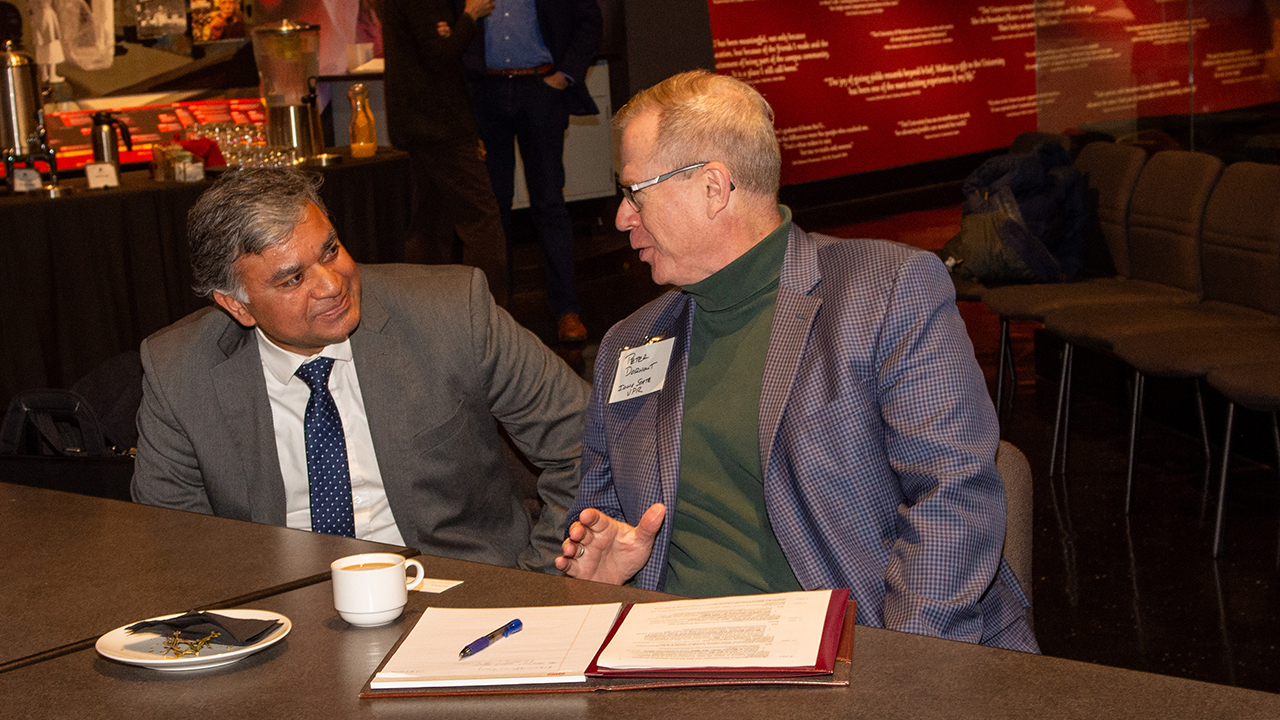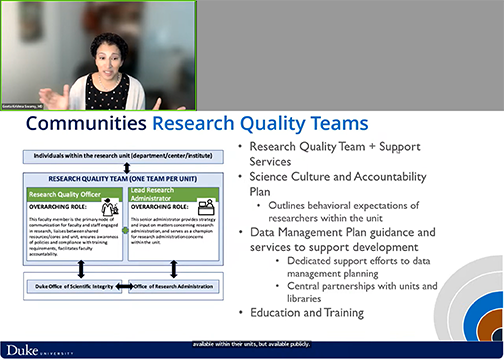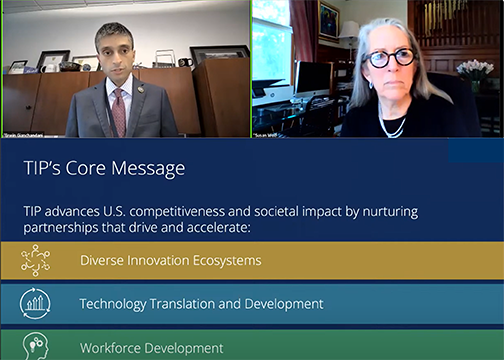
Shashank Priya, UMN Vice President for Research and Innovation, and Peter Dorhout, Vice President for Research, Iowa State University, share their thoughts at a watch party for the 2024 UMN Research Ethics Day Conference on February 28.
On Wednesday, February 28, more than 600 people from universities, companies, health care organizations, and government agencies across the U.S. and around the world gathered online to participate in the University of Minnesota’s annual Research Ethics Day Conference, hosted by the Consortium on Law and Values in Health, Environment & the Life Sciences with guidance from a faculty planning committee and a larger advisory committee. Vice President for Research and Innovation Shashank Priya also gathered colleagues at a watch party at the McNamara Alumni Center.
This year’s conference theme, “Building Partnerships to Advance Ethical Research: Collaborators, Communities, and Companies,” gave the research community a chance to reflect on what VP Priya called some of the core elements of the University’s ethical research conduct: relationship building and teamwork.
“The Research and Innovation Office oversees a large research portfolio and is responsible for ensuring that research is conducted in a responsible and ethical manner. This is what many folks in RIO handle on a daily basis and try to promote as often as possible,” VP Priya said in his opening remarks. “Responsible research requires all of us coming together to craft protocols, to craft a common set of values, and to work with oversight authorities, like the IRB, to ensure ethical conduct and processes that ensure that everything moves along in responsible ways.”
Regents Professor Susan M. Wolf, Chair of the Consortium on Law and Values, stressed the importance of focusing on partnerships in an era of increasing complex research collaborations in large, multidisciplinary teams. Research Ethics Day then began with a case study presented by Drs. Joshua Denny and Karriem Watson, leaders of the National Institutes of Health’s All of Us Research Program, an effort to gather data from one million people in the US to build one of the most diverse health databases in history. They discussed the huge range of partnerships developed, the challenges of transparency, ensuring research participants are deeply engaged partners, and making sure informed consent practices are truly effective.

Experts Dr. Geeta Krishna Swamy and Dr. Michelle Bennett focused on building research collaborations among investigators for responsible conduct of research. Dr. Swamy discussed innovative strategies at Duke University to build a culture of integrity in research, and Dr. Bennett, lead author of the NIH Field Guide to collaboration and team science, explained how team science principles can help build this culture.
Dr. Karina Walters, Director of the Tribal Research Office at NIH, and Rev. Alvin Hathaway, Sr., Co-Founder of the African Ancestry Neuroscience Research Initiative, spoke on building ethical collaborations in community-engaged and community-led research, especially in underrepresented and frequently exploited communities. Dr. Carolynn Thomas Jones from The Ohio State University and Dr. Jennifer McLeland from Washington University in St. Louis discussed ethical issues facing clinical research professionals and research staff, underscoring the importance of successful partnership between research staff and faculty investigators.

The conference wrapped up with presentations by Dr. Erwin Gianchandani, who is leading the National Science Foundation’s new TIP Directorate, and Professor Jorge Contreras, an expert on industry-university partnerships from the University of Utah Law School. They stressed the importance of universities and industry entering into partnerships with shared value propositions, which requires deliberate relationship building and clear documentation to ground collaboration.
“Each year UMN sets aside a full week for training and reflection on research ethics, with units across the University offering programs,” said Priya. “This is an opportunity for all of us to ensure that we maintain high standards of ethics, and Research Ethics Day is the centerpiece of that work.”
“This year’s conference was a great opportunity to hear from experts who are thinking and writing about key issues in research ethics,” said Peter Dorhout, Vice President for Research at Iowa State University, who joined VP Priya in participating in this year’s conference at McNamara. “I’m very interested in expanding research ethics programming and dialogs at Iowa State, and Research Ethics Week at UMN has such an outstanding reputation. The excellent presentations and discussions this past week really contribute to the professional atmosphere here.”
There were more than 50 universities represented among the attendees, including a wide array of universities across the United States as well as abroad, with representatives of Stellenbosch University (South Africa), Turan University (Kazakhstan), Alexandria University (Egypt), Ibn Rochd University (Morocco), Dow University (Pakistan), University of the Gambia, Sophia University (Japan), and the University of Copenhagen (Denmark).